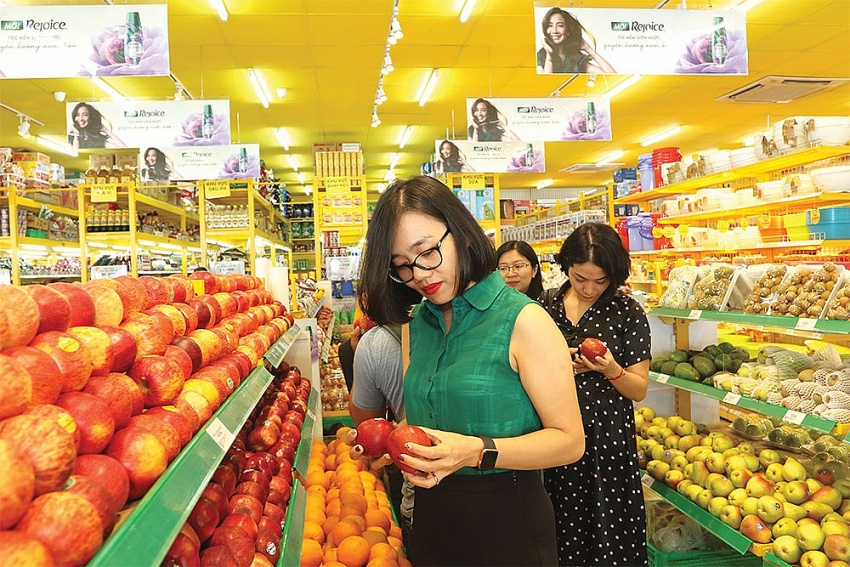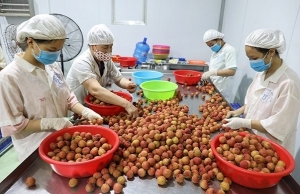Imported fruit gaining a bigger foothold in market
 |
| More countries want their fruit in Vietnam, but the conditions must be suitable, Photo: Le Toan |
Containers filled with ripe Australian peaches and nectarines arrived in Vietnam at the end of December, marking the second crop since the Australian government officially licensed the export of summer fruit products to the Vietnamese market in March 2022.
Australian summer fruit is produced in approximately 26 regions across the country. Production has risen by approximately a quarter over the last decade, and 400 growers now produce over 125,000 tonnes per annum, according to a 2022 industry report.
Chris Morley, commissioner at the Australian Trade and Investment Commission in Vietnam (Austrade), said that after testing a number of batches, businesses in both countries will have more advantages when importing, distributing, and retailing these two fruits.
“Agricultural products and fresh fruits will continue to become a key trade promotion centre in the close diplomatic relationship between the two countries,” Morley said. “Vietnam is also Australia’s second-largest export market for agricultural products, and we will be interested in developing fruit products here in the near future.”
Australia’s total fruit export turnover to Vietnam is expected to have reached $1.4 billion in 2022-2023, according to data from Austrade. Besides peaches and nectarines, the country also has great potential to export other fresh fruits such as grapes, oranges, or cherries.
Elsewhere, imported fruit products originating from New Zealand are also very popular in the Vietnamese market. Some of the most popular fruits in New Zealand include kiwi, apples, and blueberries.
Duong Gia Linh, deputy head of Import Department of Viet Products Development JSC (VPD), commented that Vietnamese consumers are increasingly concerned about their health than ever before, they are willing to spend more on imported food, especially fresh fruit products.
“Compared to fruits imported from Japan, South Korea, or North America, Australia and New Zealand have fruits of stable quality and diverse types, so they are very popular with consumers and their prices are more reasonable,” Linh said.
VPD is one of the more reputable fresh fruit importers in Vietnam with nearly 20 years of experience. Currently, 80 per cent of products imported by this business are mainly distributed and wholesaled in Ho Chi Minh City, while also still operating retail stores in Hanoi.
In addition to the quality, Linh said importers tend to choose fruits from Australia and New Zealand because of the preferential tax rate of zero per cent, while fruits imported from other markets are still subject to a tax of 8 per cent.
“Importers face many risks in terms of seasonal fruit quality, storage and transportation costs. The import market in recent years has also become more competitive. Tax incentives are an attractive solution for importers, conversely, consumers also benefit when they can buy goods at lower prices,” Linh explained.
New Zealand Trade and Enterprise (NZTE) said the total two-way trade between New Zealand and Vietnam by June 2023 is valued at $1.66 billion.
Food and beverages account for 77 per cent of New Zealand’s total exports to Vietnam, with produce fruits and nuts forming 23.4 per cent of that sector’s exports. New Zealand has consistently posted double-digit growth of the exports of apples and kiwi to Vietnam over the past few years.
“With consistent growth of New Zealand’s export of apples and kiwis to the Vietnamese market over the last few years, the potential for further growth of imported fruit consumption looks to continue, especially in terms of apples,” said Giang Nguyen, head of business development at NZTE.
“Taste, price, and product safety are currently the key drivers for consumers when purchasing fruit. New Zealand exporters who are able to clearly define and highlight these factors to Vietnamese consumers can position themselves better in the long run,” Nguyen said.
Some exporters admit that barriers in transportation and weather conditions will greatly affect the quality of the fruit when reaching consumers.
Trevor Ranford, CEO of Summerfruit Australia, said, “The other challenge is the aspect of having the right conditions within the stores to ensure that fruit retains its freshness. Currently, there are discussions in relation to Vietnamese passion fruit coming to Australia. We’re hopeful that a decision will be made very shortly between the two governments.”
 | Tra Vinh goals bear fruit for green funding Tra Vinh province in Vietnam’s Mekong Delta has seen breakthroughs in the local investment climate, for the first time climbing in the top 30 localities in provincial competitiveness and simultaneously topping the nation’s green index. |
 | Compliance with quality standards – a must to bolster fruit exports: insiders Farmers and businesses must improve product quality, and strictly follow the rules of origin and ensure food safety to boost fruit exports, experts said. |
What the stars mean:
★ Poor ★ ★ Promising ★★★ Good ★★★★ Very good ★★★★★ Exceptional
Related Contents
Latest News
More News
- PM outlines new tasks for healthcare sector (February 25, 2026 | 16:00)
- Ho Chi Minh City launches plan for innovation and digital transformation (February 25, 2026 | 09:00)
- Vietnam sets ambitious dairy growth targets (February 24, 2026 | 18:00)
- Masan Consumer names new deputy CEO to drive foods and beverages growth (February 23, 2026 | 20:52)
- Myriad risks ahead, but ones Vietnam can confront (February 20, 2026 | 15:02)
- Vietnam making the leap into AI and semiconductors (February 20, 2026 | 09:37)
- Funding must be activated for semiconductor success (February 20, 2026 | 09:20)
- Resilience as new benchmark for smarter infrastructure (February 19, 2026 | 20:35)
- A golden time to shine within ASEAN (February 19, 2026 | 20:22)
- Vietnam’s pivotal year for advancing sustainability (February 19, 2026 | 08:44)

 Tag:
Tag:


















 Mobile Version
Mobile Version